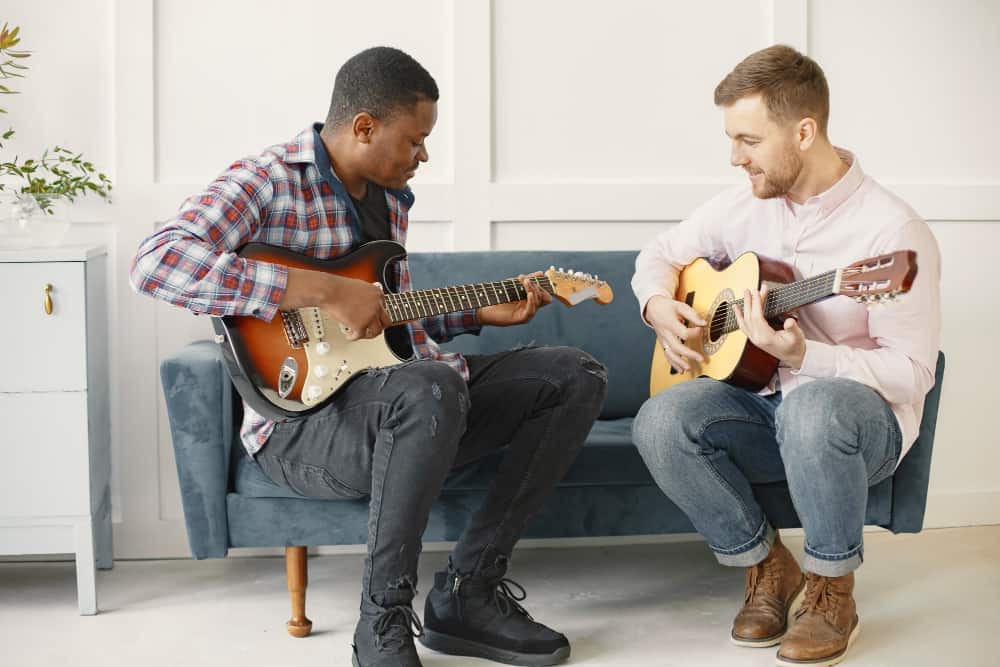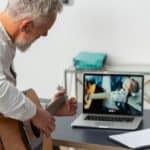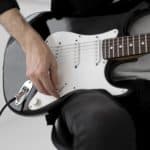Buying a guitar can seem like a big investment and as someone thinking about learning the guitar, it can be a big decision to buy something you may decide isn’t for you.
You should buy a guitar before starting lessons if you’re serious, but you should get advice from your teacher on what to look for in a guitar. You want to buy one you can comfortably play and that has good quality balanced with a reasonable price tag.
As a beginner, you want to look for something that suits your needs. You don’t need a collector’s item guitar and you will regret buying a cheap guitar. More students have quit playing guitar than I can count because their first purchase was cheap.
Reasons to buy a guitar before starting lessons
First off, you’re going to need something to practice on if you’re serious. There’s no point in going to lessons and then only getting to practice what you’ve learned at your next lesson. That’s a great way to spend a long time wasting your time and money.
Having your own guitar also creates a greater sense of investment in learning. Borrowing a guitar from someone might make you less likely to practice because of the constant nagging that this isn’t your instrument and you will have to give it back at some point.
Guitar maintenance is an important aspect of learning to play the guitar. Restringing, cleaning, and the occasional part replacement all go hand in hand with learning to play guitar and you’ll only get that opportunity by owning a guitar of your own.
Reasons to buy a guitar after starting lessons
Let’s say that a guitar is a really big investment and you’re on the fence about it.
A couple of reasons why you might want to wait until after you’ve learned a bit of guitar:
- You might already have a very busy life schedule and squeezing in guitar as a hobby could be difficult for you despite wanting to learn it.
- You may not be very serious about playing guitar and it’s just something you want to try out. That’s okay too, in this case, you might want to try your first lesson off of a spare guitar.
How to know what guitar to buy?
The best thing you can do is ask your teacher or ask a friend that already plays guitar. I would recommend that you don’t ask the guitar shop salesperson, because they will try to sell you the most expensive guitars in their store.
Here’s an abbreviated list of things to look out for:
Price range
What can you afford? Don’t go for the cheapest guitar, but don’t buy something that would put you in debt. A good starting price would be no less than $100, anything below that tends to be very poor quality. Electric guitars are generally more expensive, but you can get a fender Squier for about $120 which is pretty decent.
Comfort
Some guitars look great but are uncomfortable to use. You want to check it’s a good size, check if you can comfortably play the frets furthest from the body without straining your hand.
Check that the width of the fretboard is comfortable for you. If you have small hands, you’ll want a narrower neck and if you have big meaty hands, get something with a wider neck to start.
Your goals as a guitar player
Are you interested in learning to play indie-folk songs? Then you should probably get an acoustic guitar. If you’re wanting to play blues and metal, then you’ll be better off getting an electric guitar, because it is very difficult to sweep pick on an acoustic.
What’s important is that you get a guitar that will also suit your needs for the long term.
One caveat here is that you will often get the advice to get an acoustic guitar first. I agree with this advice a little because acoustic guitars are harder to play than electric guitars.
This means that if you switch to electric, it’ll feel a lot easier to play later. Acoustic guitars are also generally cheaper than electric guitars and you also don’t need the extra stuff that is necessary with an electric guitar.
Can you learn guitar without owning a guitar?
If you want to take a year to learn something you could have learned in a week, sure.
It’s generally not a realistic approach to learning the guitar if you’re serious about improving. It’s also not a good way to spend your time. Practice requires repetition and it’s better to practice ten minutes a day every day than to practice for an hour once a week.
Do teachers lend guitars for students to take home?
Some teachers might. If you choose to learn with a bigger music school, they may have spare guitars for students, but generally, that’s not the case.
You may find that your teacher can help you with buying your first guitar. I worked with a music school that had the option of selling guitars to their new students.
Often this is a case of the school knowing a local supplier that can provide an affordable starter guitar for their students.
What’s nice about this is that you know you’re not getting a terrible guitar, even if it’s more expensive than you thought it would be.
Can you rent a guitar if you are not sure about it?
Some sites allow you to pay a small monthly fee to loan a guitar, and in the short term, this can be a good middle ground. Just don’t go loaning a guitar for more than two to three months, because by then you’ve already paid the price of owning a guitar.
Rock n Roll Rentals provides a wide range of rental guitars and packages for you. They have different levels of guitar value and rental ranges from $13-$80 a month.
They also have a learn-to-play guitar package for $13 a month that comes with an amp included, which is frankly awesome.
Guitar Center Rentals.
Guitar center provides rentals, although their rental prices vary per store. However, they also come with great customer service and can show you how to set up if you’re completely new to guitars.
Long and McQuade
Long and McQuade also provide gear rentals, they have a greater range of guitars and they also allow for a daily or weekly rental price. Their gear rental prices range from $13 to $170 a month depending on what you rent.
My advice would be to go for the $13 rentals, because for $80, you may as well buy a guitar. Please don’t rent the coolest guitar they have on your first try, because it’s unlikely that you’ll be buying an advanced level guitar for some time.

Hello there, my name is Ramiro and I’ve been playing guitar for almost 20 years. I’m obsessed with everything gear-related and I thought it might be worth sharing it. From guitars, pedals, amps, and synths to studio gear and production tips, I hope you find what I post here useful, and I’ll try my best to keep it entertaining also.





